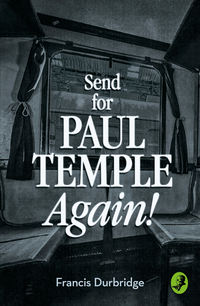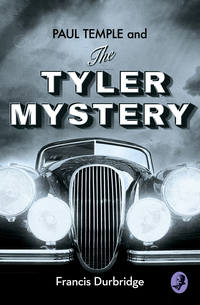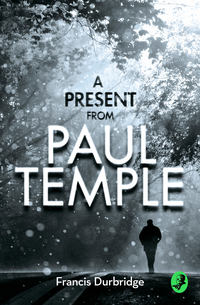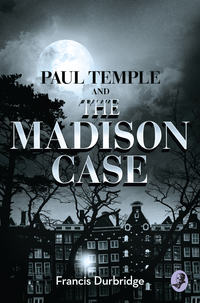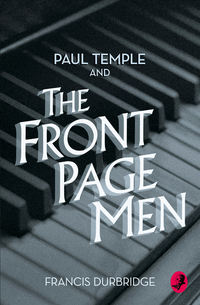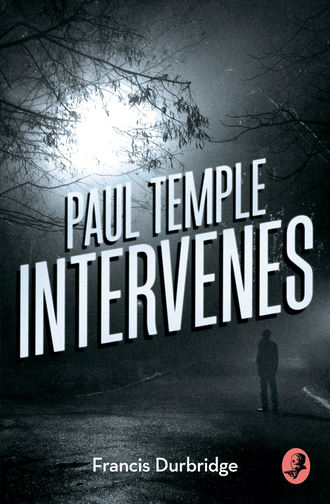
Полная версия
Paul Temple Intervenes
Hanmer suddenly shook himself like a terrier, and pushed his sou’wester on to the back of his head. Then he took a blackened pipe out of his pocket and thrust it unlighted between his teeth.
‘How long have you been in the Force?’ he asked presently, in a casual tone. It was Hanmer’s stock conversational gambit. He didn’t really want to know. What he did want was an opportunity to embark upon an account of his own varied career.
‘Me?’ muttered Briggs, straining his eyes in the direction of the dim outline of a Norwegian freighter. ‘Seventeen years.’
‘Blimey!’ ejaculated the other, in some surprise. ‘You’ve got longer whiskers than I ’ave!’
Briggs nodded solemnly. ‘I joined in August, 1925. I was with the L.C.C. before that.’
‘Salvage?’ queried Hanmer, the twinkle in his eyes going unseen.
‘Not ruddy likely! I was a Grade One clerk,’ snapped Briggs. Then he heaved a sigh. ‘All the same, it was very tedious. I reckon I must have filled in best part of a million forms of one sort or another in the four years I was there.’
Hanmer laughed.
‘Talk about tediousness, you want this job reg’lar. Up and down the ole river night after night.’
He sucked at his pipe reflectively.
‘Before this I had a nice little beat in Hampstead. Not much doing, but plenty of good grub in one or two kitchens I could mention. I remember once when I—’
He broke off abruptly and leaned over the side of the boat, gazing intently at a grey object which was only just visible. His electric lamp flashed, startling Briggs.
‘Swing her round, mate,’ said Hanmer, softly. Briggs immediately shut off his engine, and the boat nosed its way silently towards the grey object which Hanmer kept focused in a circle of light from his torch. Retaining a cautious hand on the wheel, Briggs leaned forward.
‘Good God, it’s a woman!’ he exclaimed as they came within easy reach.
‘Not much more’n a kid, I reckon,’ grunted Hanmer, focusing his light on the face and hair. As they came alongside, Hanmer leaned over and managed to bring the girl’s head and shoulders almost into the boat. ‘Give us a hand,’ he gasped, and Briggs left the wheel to take care of itself for a moment.
Within a few seconds, they had laid the dripping figure of the girl along the well of the motor boat. Hanmer pushed back the sodden hair and whistled softly to himself.
‘Another of ’em. She’s a goner all right. Looks like she’s been in the river for hours.’
‘What about trying artificial—’ Briggs was starting to suggest, but the other cut him short.
‘She’s been dead hours. I know the signs. Not a bad looking kid,’ he decided. ‘We ain’t pulled out a real good looker since that houseboat murder – she was an actress – not that she looked much when we got her out.’
Briggs was paying no attention, but had stooped and unfastened the blue mackintosh that clung to the girl’s figure. His start of surprise distracted Hanmer who was busy extricating a bulky notebook from an inner pocket.
‘What is it? What’ve you got there?’
With clumsy cold fingers, Briggs was unfastening a small square of white cardboard which was pinned to the girl’s dress. Hanmer picked up his electric lamp, and together they examined the sodden pasteboard. Two words were carelessly scrawled in Indian ink. ‘Good God!’ whistled Hanmer. ‘The Marquis!’ It must be recorded that Sergeant Rupert Josiah Carrington Briggs experienced an extremely unpleasant sensation in the pit of the stomach.
CHAPTER III
Crisis at Scotland Yard
SIR GRAHAM FORBES, Chief Commissioner at New Scotland Yard, was a firm believer in method – and an even greater believer in his own method. And his severest critics amongst the younger members of his staff had to admit that the Chief Commissioner’s methods, evolved over a period of many years’ experience, usually proved successful. They might provide a number of minor irritants; they might even appear to retard the incidence of Justice, but in the end they were invariably effective. Comparative strangers might deride his absorption in minor routine, but Forbes went his way entirely undeterred. His system had stood so many tests, that he had the utmost confidence in its efficiency.
True, he had encountered one or two setbacks recently in the case of The Marquis murders which were being accorded such extravagant publicity by the press. But Forbes was inclined to make allowances for the press-men. After all, they had to give their readers something lively to read over their breakfast tables and on their tedious journeys to and from work.
That his faith in his system was quite undiminished was demonstrated this fine autumn morning by the presence on his desk of seven folders of varying colours.
There was something reassuring about those folders. They contained every scrap of evidence so far retained in connection with The Marquis murders. It was merely a question of sifting facts in the light of new evidence, Forbes told himself as he listened rather vaguely to the argument which was developing amongst his subordinates. Each of them appeared to have his own theories and plans for substantiating them.
At length, Forbes tapped his desk with his paper-knife.
‘Gentlemen, when you’ve quite finished your little brawl, perhaps we can manage to document one or two more facts. Now Bradley, let’s hear what you have to say first. I don’t think you’ve given us a complete statement lately.’
Superintendent Bradley, a sandy-haired, dour individual in the late thirties, shrugged his shoulders impatiently. There was no more reliable man in a tight corner, but he was always inclined to take the law into his own hands, and was notoriously incapable of appreciating the law-breaker’s outlook on life.
‘There seem to have been too many statements made just lately, Sir Graham, if you want my opinion,’ he began, bluntly, indicating the folders. ‘You’ve got a packet of ’em there.’
The others smiled. They knew that Bradley’s favourite method was to seize his man and hammer the truth out of him.
‘What we want is action!’ announced Bradley, decisively. ‘And by God we want it now, before it’s too late!’
‘Look here, Bradley,’ snapped Chief Inspector Street, a dark, lanky individual with keen eyes and a sensitive mouth. ‘It’s all very well for you to talk about action, but you don’t seem to realise the devilish cunning of this man we’re dealing with.’
‘What I realise, Street,’ retorted Bradley, the colour mounting at the back of his neck, ‘what I realise is that seven people have been murdered – one for each of the Chief’s pretty folders. And if it goes on at this rate we shall soon exhaust all the colours of the spectrum.’
Street was about to make an angry reply, but the buzz of the telephone cut him short, and with an impatient gesture Sir Graham lifted the receiver.
‘Hullo? I told you not to interrupt Dickson unless—’ he paused and his expression hardened. The lines on his face deepened as he listened intently to the message. After a moment, he picked up his Eversharp pencil and made one or two notes on a pad at his elbow. Finally, he replaced the receiver and amid an expectant silence slowly opened a drawer and extracted a magenta folder. As he did so, he turned to Bradley with a grim smile.
‘You seem to be a thought-reader, Bradley. We’ve got another murder on our hands, just as you predicted.’ He tore the note from his pad and clipped it neatly inside the folder.
‘Who is it this time?’ It was Street who spoke.
‘A young girl. They picked her out of the river last night,’ announced Sir Graham, wearily.
Even Bradley seemed taken aback.
‘You mean it’s The Marquis?’
The Chief Commissioner nodded. ‘They found the usual small square of white cardboard pinned to her dress,’ he said.
Inspector Ross, a middle-aged sharp-featured individual, who had spoken very little so far, leaned forward in his chair.
‘The man’s conceited, Sir Graham,’ he pronounced, definitely, ‘or he wouldn’t go in for all this card business. It sounds to me like Con Landon. We haven’t heard anything of Con since he was released six months back.’
Forbes shook his head.
He deplored Ross’s weakness of associating known criminals with unsolved crimes. Sometimes it worked, but it was very risky and might mean the loss of a considerable amount of time.
For a few seconds there was silence. Street stood at the window looking gloomily at the traffic rushing along the embankment. At last he turned to ask: ‘Have they identified the girl?’
‘Not yet,’ replied Forbes.
Bradley seemed surprised. ‘That’s damned odd, isn’t it?’ he demanded.
‘Give the boys a chance,’ snapped Ross. ‘They only picked the girl out of the river last night.’
Bradley strode excitedly over to Forbes’ desk.
‘Don’t you see what I’m driving at, sir?’ he said, forcefully.
‘Perhaps you’ll enlighten us, Bradley,’ replied Forbes, in a patient tone.
‘But it’s as plain as the nose on your face. All the other victims of The Marquis were well-known people, celebrities in fact. They were identified almost immediately. Myron Harwood! Sir Denis Frinton! Carlton Rodgers! Lady Alice Mapleton! Their death was bound to get into the headlines.’
Sir Graham pondered upon this for a few moments.
‘There’s something in what you say, Bradley,’ he agreed, at length. ‘Maybe we’ll be able to work on this angle.’ Bradley was about to enlarge upon his theory when he was interrupted by the arrival of a sergeant who brought the Chief Commissioner a note marked Urgent and Strictly Confidential. Forbes read it carefully, then let it fall on his desk. He passed a weary hand over his forehead.
‘Anything wrong, sir?’ asked Bradley.
‘No,’ answered Forbes. ‘Just a note from Paul Temple.’
‘Paul Temple!’ Both Ross and Bradley spoke at once.
‘I thought he was in America,’ said Street.
The Chief Commissioner’s announcement had obviously aroused some interest. ‘Perhaps I’d better read you the note,’ he suggested, picking up the paper again. ‘It may convey more to you than it does to me.’
He read:
Dear Sir Graham,
Steve and I have just returned from the States. Why not dine with us tomorrow evening. Shall look forward to seeing you.
Kindest regards,
Paul Temple.
‘Sounds innocent though,’ sniffed Bradley.
‘Just a minute,’ said Forbes slowly. ‘There’s something else here.’ After a pause, he read:
‘P.S. Is it true what they say about Rita?’
Ross looked across at Street in obvious bewilderment.
‘Is it true what they say about Rita?’ Bradley repeated.
‘Who the devil’s Rita?’ asked Ross, in puzzled tones.
‘Why has Temple come back, anyway?’ Street wanted to know. ‘D’you think the Home Secretary has cabled him?’
Any further speculations were cut short by the ringing of the telephone. After a brief conversation, consisting mainly on his part of a series of ejaculations, Forbes swung round in his chair and declared: ‘They’ve identified the girl.’
‘Good work,’ approved Street. ‘Who is she, sir?’
‘Her name,’ said the Chief Commissioner deliberately, ‘was Cartwright. Rita Cartwright.’
CHAPTER IV
The Girl Who Knew Too Much
WHEN Steve heard Temple direct the taxi-driver to the nearest airport, she could not repress a start of surprise.
‘I had no idea we were going to fly back,’ she said, as they settled inside the taxi. ‘When did you decide that, Paul?’
‘As soon as I received that second message,’ he replied, calmly. ‘A criminal who is sufficiently on the inside to know that the Home Office had cabled me, and furthermore who has a copy of the secret code, is a man who is going to take some catching. So it seems to me that there’s no time to be lost.’
At the aerodrome, they were fortunate enough to secure the last two available seats in a plane which was due to start for New York in just under an hour. When they had partaken of a light meal in the aeroplane, Temple settled down to compose a message to the Home Office, then decided to defer sending it as his code book was not easily accessible. Eventually, he telephoned London just after they landed, and was agreeably surprised to learn that if he applied to the commanding officer of a certain military aerodrome, there would be transport facilities supplied for himself and Steve in the next Liberator to be ferried over.
They found themselves in London four days later.
Pryce welcomed them as inscrutably as ever. Temple had telephoned him from the aerodrome. They were busily unpacking one or two essentials when the man-servant remarked: ‘I forgot to mention, sir, that there’s a young lady who’s rung up several times. A most persistent young person by the name of Cartwright.’
Steve and Temple looked at each other in perplexity and shook their heads almost simultaneously.
‘I can’t think who it would be,’ said Temple.
‘Oh, she said you wouldn’t know her, sir, but apparently she knows you. And she said it was most urgent that you should get into touch with her as soon as you returned. I made a note of the telephone number on the pad.’
When Temple telephoned Euston 6347 half-an-hour later, a charming feminine voice answered him.
‘Thank goodness you’re back, Mr. Temple. How soon could I see you? It really is most urgent!’
‘Where d’you suggest as a rendezvous?’ asked Temple.
The girl hesitated for a moment.
‘Do you happen to know a public house off Holborn called The Last Man?’ she asked. ‘They have a quiet little room at the back. If you could meet me there in half-an-hour, it would be on my way to rather an important appointment I must keep at eight o’clock.’
‘I know the place quite well,’ Temple assured her, for he was pretty well acquainted with every detail of the district. ‘I’ll be there in half-an-hour from now.’
When Temple arrived, The Last Man was almost empty. Rita Cartwright was sitting alone in the little room at the back of the saloon bar. Temple was rather taken aback at her extreme youth; judging by the voice on the telephone he had expected someone a great deal older. The girl only seemed to be about twenty: though she was by no means becomingly dressed in a dark mackintosh and a worn green beret. Temple noted that she was drinking neat rum.
‘Trying to summon up some Dutch courage,’ she explained with a wry smile, after she had introduced herself. ‘I’ve a ticklish job this evening – I’ve an idea I may have taken on more than I can tackle.’ As she spoke the girl shrugged her shoulders and smiled disarmingly.
‘Well, I’d better begin at the beginning and tell you I’m a private detective of sorts, and my big job at the moment is investigating the murder of Lady Alice Mapleton. I don’t mind admitting that this is my first murder case! And it’s certainly some case, Mr. Temple,’ she added, with a smile.
‘Wasn’t that one of The Marquis murders?’ asked Temple.
The girl nodded. ‘The first. As far as I know, the police are still completely in the dark about it, and if I pull this off it’ll be a feather in my cap.’
Temple could not repress a slight smile at her youthful enthusiasm.
‘You’ll pardon my making such a trite observation,’ he said, pleasantly, ‘but you’re extremely young to be tampering with dangerous criminals.’
She took a gulp at her rum.
‘Young I may be – I’m twenty-four to be exact – but I seem to have hit upon clues that so far have evaded the police. But I haven’t kept to my story. I’d been established in my present job just under a year when Lady Alice Mapleton was murdered. I had just recovered a diamond bracelet for the Honourable May Bennerton – rather a tricky job which pleased her a lot. Well, she paid my fee, and I’d almost forgotten the case when she arrived at the office one day with a very superior Society person whom she introduced as the Duchess of Mapleton, the mother of Lady Alice Mapleton. The Honourable May introduced us and then discreetly left us together.’
‘Very gratifying,’ smiled Temple, offering her a cigarette and lighting it for her. ‘And then I presume the Duchess placed her cards on the table?’
Rita Cartwright nodded.
‘Like all members of ancient families, she was scared stiff of scandal. But she told me everything she knew: beginning with the fact that Lady Alice was a cocaine addict.’
Temple whistled, thoughtfully.
‘That would explain quite a number of things,’ he murmured.
‘It was obvious that the Duchess was devoted to Alice – she was her only child,’ continued Rita. ‘And she wasn’t at all satisfied by the results the police were getting. But she was afraid to help Scotland Yard by telling them everything she knew because of the unpleasant publicity which might be involved. Her idea then was that with all the extra help she could give me, I could possibly track down the murderer without the full story becoming public. She seemed quite positive that the murderer had some connection with the dope business, and on the face of it I was inclined to agree with her.’
‘The theory certainly has possibilities,’ Temple agreed.
‘And I’ve explored them thoroughly. The Duchess left me a valuable piece of evidence in the shape of Lady Alice’s diary. On the last page there was a pencilled note: Limehouse 7068 – ask for Sammy!’
Temple smiled. ‘So you got in touch with my old friend, Sammy Wren,’ he said. The girl laughed.
‘Right first time. I asked him if he could get me some of the dope, and he fell for it. I went along to an address in Bombay Road and collected the stuff. I’ve been there several times since, and it’s put me in touch with quite a number of the gang. However, up till now, they’ve always been subordinates, referring to the head man in awed whispers. I could never get the merest inkling about him, until this week I decided to force their hand.’
‘You appear to be a very daring young woman,’ said Temple, admiringly. ‘Exactly how did you force their hand?’ Rita stubbed out her cigarette.
‘I told them I had an order for about five times the usual quantity, but it was essential that I should see the Chief to make certain arrangements for the distribution of it. One of them went into the next room and made a telephone call: when he came back he said I could see the Chief at eight o’clock tonight.’
Temple flicked the ash from his cigarette and looked at the clock. It was ten-past seven.
‘And you’ve conducted all these investigations entirely on your own?’ he asked.
‘Practically. In the course of making them, I’ve run across a young fellow named Roger Storey, who was engaged to Lady Alice, and seems to have some vague idea of exacting a terrible revenge for her death. He’s one of those innocuous young men with plenty of money and unlimited time on his hands. We’ve met several times and discussed many theories about the murder. He helped me to follow up some investigations about a man named Sir Felix Reybourn.’
Temple looked up, quickly.
‘The Egyptologist? What about him?’
‘Nothing really definite, apart from the fact that he was, as far as we can trace, the last person to see The Marquis victims alive.’
‘That’s very remarkable,’ said Temple with a thoughtful frown. ‘Are you quite sure about it?’
She shook her head. ‘I’m still working on that angle of the case – of course, if Sir Felix turns up to our appointment tonight, then it’ll be quite straightforward. All the same, keep it under your hat for the time being.’
Temple pressed the bell and ordered more drinks.
‘I really must congratulate you on a smart piece of work,’ he said. ‘There’s one aspect of the business really puzzles me though.’
‘What’s that?’ she asked.
Temple placed her drink in front of her and added soda to his whisky.
‘What puzzles me is the reason why you are so anxious to tell me all this?’
The girl smiled.
‘The Duchess of Mapleton has several influential friends at the Home Office. Last week, she told me that you were being called in on the case. She was rather worried because she thought you’d be sure to get on to the dope business. So I suggested that I should take you into our confidence and leave the rest to your discretion. I said that according to Who’s Who, you had been educated at Winchester and Oxford, and that seemed to pacify the old dear.’
Temple laughed.
‘I’m sure I couldn’t wish for a more intelligent partner,’ he declared, sincerely. ‘But I really think you should allow me to come with you tonight.’ The girl shook her head most emphatically.
‘No, no—that would ruin everything. I’m not aiming at a showdown in the Bombay Road. I just want to discover the identity of the leader. After that, it ought to be plain sailing.’
‘As a precaution, Miss Cartwright, would you mind telling me the number of the house in Bombay Road?’
‘Why, of course, it’s 79A. But promise you won’t interfere in any way. If I can pull this off myself, it’ll be a feather in my cap.’
‘It’ll be a complete head-dress,’ Temple assured her, with a twinkle in his eye. ‘But I would like to add a word of warning.’
‘Well?’ she smiled.
‘Don’t be too certain about the plain sailing. My own experiences have always lain amongst some very rough seas.’
Rita picked up her handbag and tucked it under her arm.
‘I’ve been lucky so far,’ she said, lightly. ‘Maybe my luck will hold.’
But there was a look in her pale blue eyes which seemed to doubt her words.
Sir Graham Forbes stirred his coffee and reflected that Paul Temple and Steve had changed very little since the days when they had joined him in the relentless pursuit of the Front Page Men. If anything, Temple was perhaps a trifle more sunburnt and had possibly lost a little in weight.
During dinner they had talked mainly of Paul Temple’s visit to the United States, and Forbes had many questions to ask concerning the F.B.I, and other officials whom he knew out there. It was not until he had half-drained his cup of coffee that Forbes suddenly demanded: ‘What did you mean exactly by that postscript?’
Temple knocked the ash off his cigar and frowned thoughtfully. At length, he said:
‘Out in the States, Sir Graham, I was attached to the “C” branch of the M.O.I.’
‘I gathered you were up to something of that sort from what Colonel Randall told me,’ nodded Forbes.
‘While we were there,’ Temple continued, ‘the newspapers started spreading their front pages with a story about this fellow called The Marquis. At first, I thought the whole business was grossly exaggerated, but one evening about a week ago I received a special radio message from the Home Secretary’s office that rather changed my ideas, and I knew then …’ He hesitated.
‘You knew then that, to put it mildly, things were getting pretty serious.’
Paul Temple smiled in some relief as he realised that Forbes knew rather more than he had anticipated. ‘I didn’t particularly want to leave the States, Sir Graham. It was interesting work out there – always something moving, and I was beginning to show some results. But I could hardly ignore that message.’
Sir Graham placed his cup on the table and leaned forward.
‘The Home Secretary had a very good reason for sending for you, Temple,’ he declared quietly. ‘I realised a month ago that you were the only man for certain aspects of this job. We need your help, Temple, that’s the long and short of it. We need your help pretty badly.’
Temple and Steve exchanged an understanding glance.
Temple said: ‘I’m very relieved to hear all this from you, Sir Graham. You know I’ve never had any desire to intervene in any of your cases, and I’ve no intention of doing so now if—’
‘Don’t talk nonsense, darling,’ interrupted Steve, refilling Sir Graham’s cup. ‘You know perfectly well that you have every intention of intervening. And you still haven’t answered Sir Graham’s question about Rita Cartwright.’


